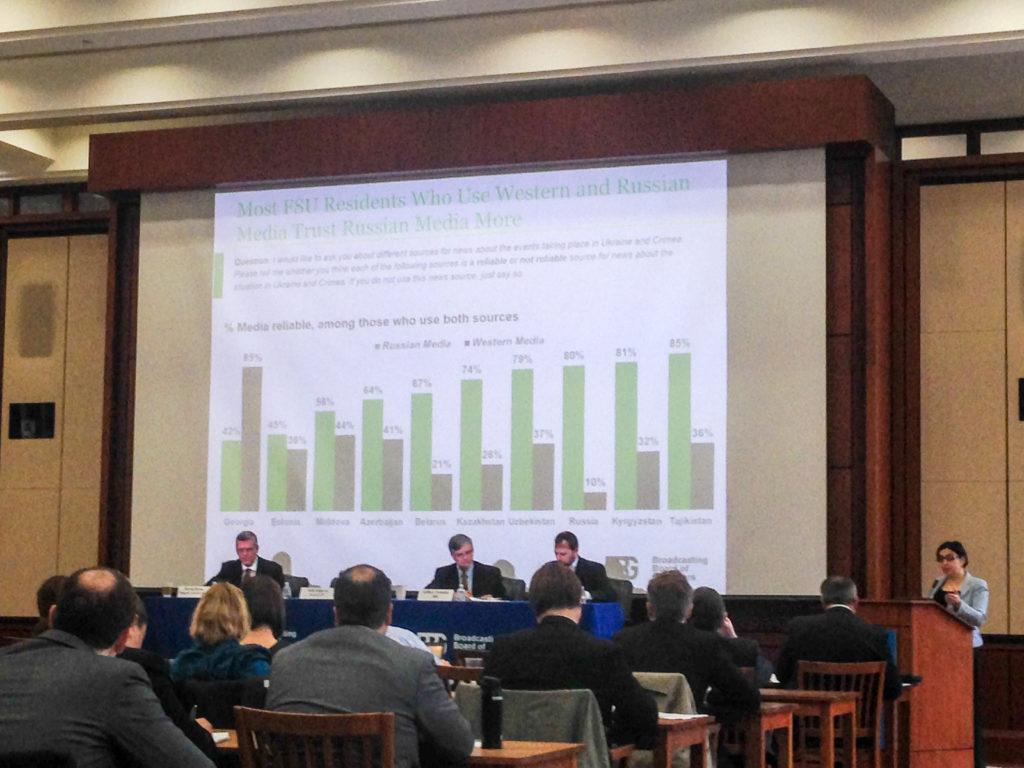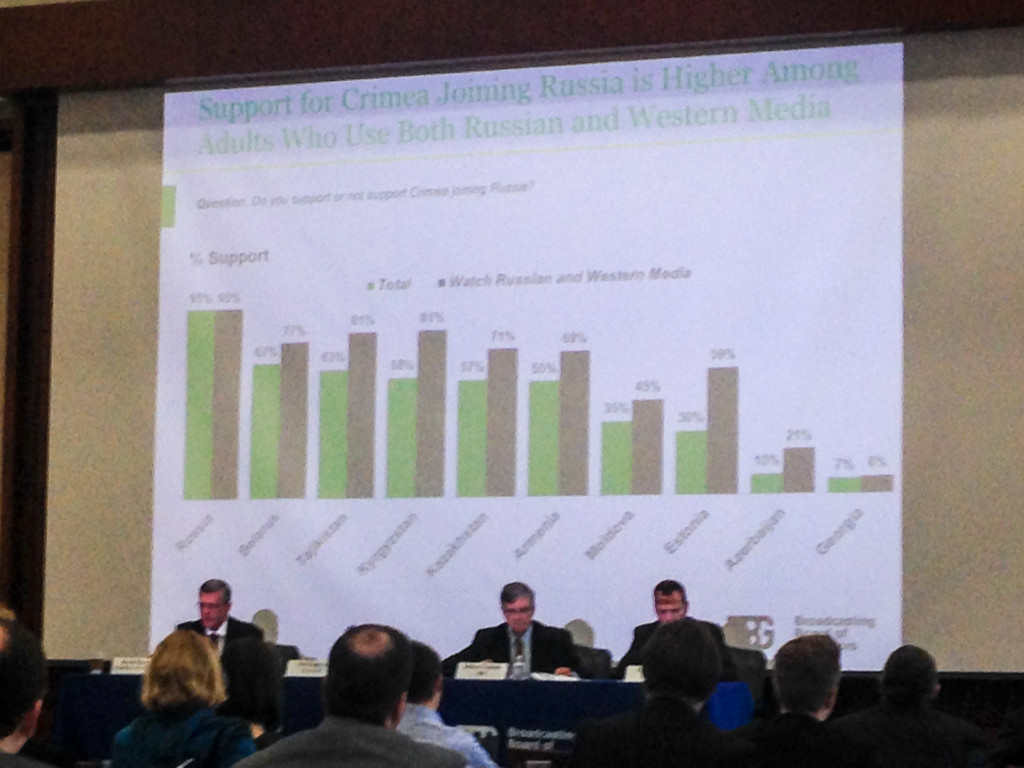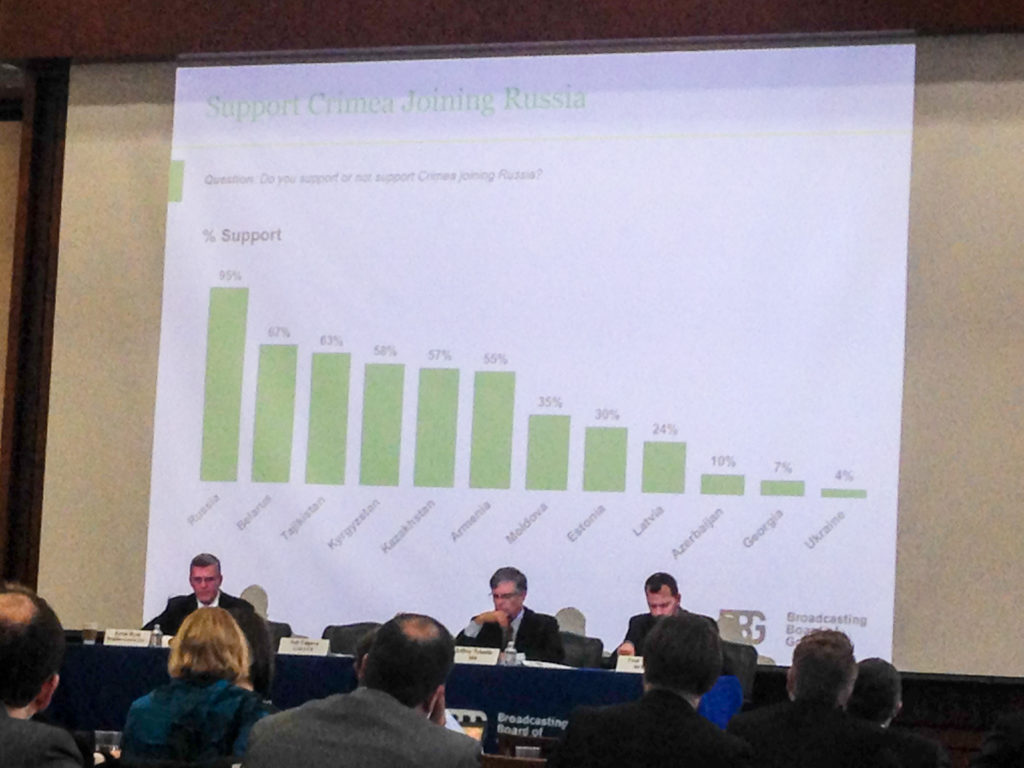Broadcasting Board of Governors Losing The Information War: Hand Me A Shovel
By The Federalist
A recent BBG Watch post (“New BBG CEO John Lansing is having a positive impact, but is it enough?”) suggests that John Lansing, the Broadcasting Board of Governors (BBG) Chief Executive Officer (CEO), may be making some progress inside the worst agency in the Federal Government.
We believe the observation to be premature even considering BBG Watch’s warning that there is no chance a single executive, no matter how good, can turn around a failing agency without major structural reforms which require new legislation.
This is not to say that Lansing may be trying, but there are significant obstacles in his path.
Consider the following:
Let It Snow, Let It Snow, Let It Snow!
There is nothing like a winter snowstorm in the congested and unprepared transportation grid of the Washington, DC area. That is exactly what happened over the weekend of January 22-24, 2016. This storm virtually shut down the region with upwards of 3 feet of snow – often with no place to move it or put it. Many school districts were closed the entire following week. The subway system was completely shut down for 48 hours. One local government manager noted that the DC area had a year and a half’s worth of normal winter snowfall over one weekend.
If you were inside the Cohen Building, you knew what to expect:
You’re on your own.
In this scenario, employees are typically left to rely on vending machines for snacks and beverages. There is no plan for any extensive disruption: no planned stockpiles of food and water. Employees had cots to catch some sleep. Don’t’ be surprised. We learned in December that International Broadcasting Bureau (IBB) executives also did not have an effective emergency plan to deal with a multi-hour electrical power outage and multi-day digital processing and storage outage for Voice of America broadcasters.
After the storm, Kelu Chao, the acting Voice of America (VOA) director, released a memo, praising agency employees who survived the Cohen Building during the blizzard.
We’ve seen it all before. There is nothing new here. What is new is the presence of John Lansing. Managers are wary. The memo rightly gives credit to VOA broadcasters who had made sacrifices, but while Ms. Chao is not responsible for IBB support services, the memo may also create both a disingenuous and insincere impression that IBB was actually prepared for this emergency. Many outsiders don’t know that VOA is doomed to rely on IBB executives for support services. They may think that the agency’s senior IBB bureaucrats are concerned for the welfare of agency employees.
They are not.
It is all part of the orchestrated effort to make themselves look good, particularly with John Lansing observing how the agency responds in various circumstances. These memos are management “spin,” saying in effect, “Look at me. I’m a great manager. I wrote this memo praising the employees.”
Blah – blah – blah.
The other predictable response by agency officials was to have a “pizza party” in the aftermath of the storm for employees who had been stranded in the Cohen Building during the blizzard: a specious and trivial gesture toward the workforce: similar in nature to handing out cookies at Christmastime. IBB executives should have had a supply of frozen pizzas in the building before the storm hit, to be ready when people could not find food to eat, not afterwards.
As an agency employee, you now know what your value is to this agency: a slice of pizza or a cookie after yet another senior management failure.
In more professional surroundings, there are other ways to acknowledge the service of employees in circumstances that go above and beyond the norm.
Not so in the Cohen Building.
We don’t know how Lansing feels about the pizza party. We don’t what Lansing was told about having a pizza party. No doubt, someone within the bureaucracy may have told Lansing this was a way to boost morale inside the agency.
You’ve got to be kidding.
Mr. Lansing would be well served to remind himself that this is one of the worst agencies in the Federal Government, as we noted above. There are reasons why. “Pizza parties” is one of them, right up there with “ice cream socials.” If managers do their job right and treat the employees the right way, a pizza party won’t be necessary. If you don’t do your job right, a pizza party won’t help.
It’s one of the ways the Third Floor likes to demean and belittle agency employees who do the real work of the agency – in spite of and not because of the bureaucracy that has destroyed the agency’s mission.
Surrounded, Outnumbered and Out-Maneuvered
Mr. Lansing is surrounded by the people who put the agency in the position it is in today and has been for the better part of the last fifteen years or more.
If Mr. Lansing chooses to ignore that fact, he is one step closer to a short stay as the agency’s CEO. From the perspective of these hardcore bureaucrats, they won’t miss him when he’s gone – and gone sooner is preferable to gone later. Mr. Lansing is not going to change their behavior because to do so would deny the essence of who they are, who they want and intend to be.
We know these people by name and their positions on the agency’s staffing pattern. They have been present in senior positions for a very long time enabling and directing the agency’s descent into the abyss. Their names are synonymous with the agency’s posture of:
- “Dysfunctional” (Heritage Foundation scholar Helle C. Dale)
- “Practically Defunct” (Hillary Clinton)
- “Broken” (US statesmen, diplomats, media experts and journalists interviewed by former BBG member S. Enders Wimbush and former Radio Free Europe / Radio Liberty executive Elizabeth M. Portale)
- “Truly Rudderless” or Leaderless (Chairman of the House Foreign Affairs Committee, Rep. Ed Royce)
As well they should because they are the architects of this posture. They are very content with the disaster they have created. They are proud of themselves and continue to reward themselves – and you can bet that they don’t think of rewards in terms of a slice of cold pizza or a stale cookie.
We know these people very, very well. They put on a good act for the misinformed or uninformed. They act like the injured party when the employees react negatively to their games and tricks, as in annual Office of Personnel Management (OPM) Federal Employee Viewpoint Surveys (FEVS). These bureaucrats make the employees out to be the problem. They say that all journalists are a disgruntled bunch.
Civil Service regulations prevent these officials from being fired. They are not being retained for their competence, because they have none. In short, they are gaming the system.
On The Big Stage
Clearly, Mr. Lansing is being played by the purveyors of the status quo, whether he knows it or not, whether he believes it or not.
As bad as all of this is, there is one thing that trumps all else in Mr. Lansing’s travels down the road of this agency’s failures and it is political:
Mr. Lansing is on record as saying while some reforms are needed, there is no need for congressional legislation H.R. 2323 to drastically restructure US Government international broadcasting, in part declaring there is no need for the two CEO model favored by the Congress (one for VOA, the other for the grantee broadcasters). In effect, he has marginalized himself by failing to recognize or acknowledge the scope and extent of the agency’s many ills.
In addition, Mr. Lansing is not CEO for life. In January 2017 a new administration takes office. That also means a new group of individuals appointed to the BBG. Those members serving on expired terms will be replaced – and likely following them out the door will be Lansing – particularly if there is no substantial turnaround in the agency’s performance. That turnaround is not likely to happen. A new board will want its own CEO with a fresh perspective.
Rational people know that one CEO has no chance of turning this agency around. The “one CEO” position is like putting a Band-Aid over multiple and deep puncture wounds. And this agency has them in abundance.
Last But Definitely Not Least
You just have to wonder about some of the people inside the Cohen Building. To outward appearances, they seem to have this uncontrollable urge to put themselves front and center when the more appropriate thing to do is to close the door to their office, lay low and try to be unnoticeable.
A most recent case in point would have to be Kim Andrew Elliott. After a long hiatus, Mr. Elliott has put himself back on the radar with a recent commentary.
Multiple radars.
As if John Lansing doesn’t already have a groaning list of priorities, Mr. Elliott chose this time to offer his opinions about the agency’s audiences.
For the informed among us, this is an argument the agency can’t win. And Elliott shows how the agency goes about losing.
The most important thing to remember is that the agency likes to flip-flop between two positions:
The first argument agency officials like to float is that it is increasing its audiences. That argument has been repeatedly shot down. Its audiences, and especially its impact, have declined since the end of the Cold War considering global population growth and emergence of new media such as the internet during that time. It’s worth noting that a large portion of the heralded growth consists of placement programs in countries like Mexico and placement programs with self-censored news. Diluted over 43 languages (as relates to the Voice of America) and spread out over a global population of over 7-BILLION, the effect is no audience and no impact of any consequence.
The second argument, offered again by Mr. Elliott, is “quality over quantity:” a claim by the agency (and Elliott) that the agency is reaching “societal elites.”
This is ludicrous.



When you stop laughing over that one and after looking at these images from this week’s BBG/Gallup conference in Washington, here’s the deal:
There is no huge clamoring among societal elites for the BBG point of view. In today’s world, societal elites have an enormous range of choices among international media to develop their views. In short, this is one aspect of what has come to be known as “confirmation bias:” gravitating to media that is in line with one’s point of view.
But more importantly as regards the Elliott piece, his position reflects the opinion that is rampant through agency officialdom is that the agency is automatically entitled to credibility and relevance.
Those days are over, if they ever existed at all.
The strategic lesson beyond the grasp of agency officials is that people don’t see things the way the United States does. And that means a rather deep and abiding strategic concern that the United States has substantially reduced credibility across all population demographics.
Not only did his comments get the attention of BBG Watch, but also reportedly drew rebuke from John Lansing as well. In response, Elliott pushed himself way above the radar by making a comment about “a rare convergence” of opinion by both BBG Watch and BBG officialdom.
Lansing is surrounded by people who don’t mind being brazenly wrongheaded and defiant. Symbolically, Elliott’s retort to the criticism of his views is more dissing of the agency’s CEO and entity heads who reportedly fully supported Lansing’s assessment.
Mr. Elliott is entitled to his opinions. But at the same time, opinions may come with bad consequences in Congress and in the rest of Washington for BBG and those employees who do not share Mr. Elliott’s views. Recycling these worn out arguments over the agency’s audience seems a clear indication that much of the agency’s senior staff still has no new thinking on this and many other subjects regarding its performance failures.
Elliott’s views go a long way toward making the case that the agency is a burned out symbol of a bygone era, increasingly irrelevant to contemporary times and incapable of reconstituting itself and being mission effective unless American taxpayers and Congress do something to make it effective.
The Federalist
February 2016

